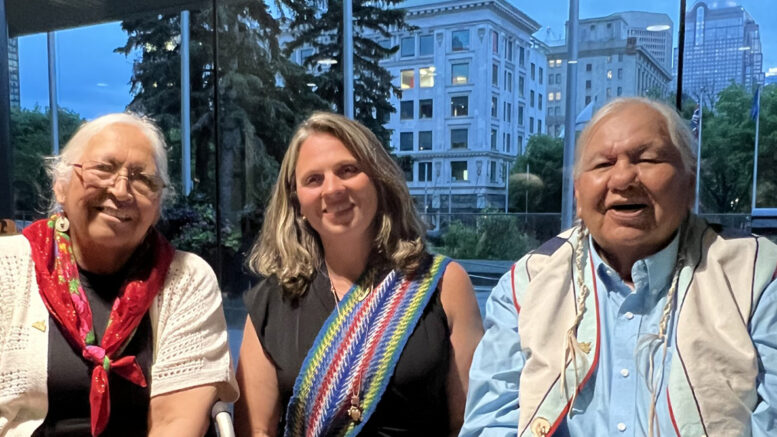By Laura Mushumanski, Local Journalism Initiative Reporter
(ANNews) – Back in the day, our ancestors were nomadic and would lug around their belongings across the open lands. What would happen on a given day if they forgot to smudge? Would they stop everything they were doing when moving camp for various reasons, one being to search for food or safety? Or would they have considered the teachings that were shared with them on how to be a good neighbour, think good thoughts, be accountable, and not inflict harm onto others to walk in ceremony every day?
These questions can be part of understanding how to be and act in the world, to think of things thoroughly. As Sharon Goulet, an Indigenous Relations Strategist with the City of Calgary believes, “behaviours are more important than intention; you can say you want to do all these things, but if you don’t do them they mean nothing. People must be accountable to make changes; you must be the author of your own truth.”
Goulet, a citizen of the Otipemisiwak Métis Government in Alberta has always believed in the power of community and as a social worker, has come to know the importance of using and honouring information learned from other people and applying it. “I learned from Elders about doing no harm always and listening to people’s truths,” said Goulet, “but also not take away from what people are trying to share.” Over her 31-year career as a social worker she has faced all kinds of emotions. “I try to tell the truth. Sometimes people get really upset and angry, and I tell people that they must understand that building relationships with Indigenous peoples is the first step and is not a quick win.”
Sharon has learned to be an active listener and observer, for example noticing how the Truth and Reconciliation Commission (TRC) has moved from survivors sharing with support and openness to western institutions taking over. While ownership and action from western allies is critical, the messages and truth from survivors can never been lost. “It’s about real people with horrible stories,” says Sharon. “Over 31 years I learned how to listen with my spirit. Like in yoga, you learn to be in the moment, but you are not reacting. Because when you react, you are adding to people’s trauma. When you react, you are retraumatizing the person while getting upset and victimizing yourself instead of being a support.”
There was a time when Goulet couldn’t share in circle because she would burst into tears. Since then, she took accountability for her own healing, such as learning from many different Elders, particularly Dr. Reg Crowshoe. “I have learned the importance of letting people share their story and being calm when listening. There are many moments that I could get upset, instead I find ways to help people hear and understand in other ways. If you go in with anger, people are never going to understand, and they are never going to immerse themselves in learning differently and being open. You must do it in different ways.”
These different ways of knowing that Goulet speaks to are rooted in long term relationship building, that being active in engaging with others and being open to learning the truths of Indigenous people’s stories with Canada only starts by building good relations first.
This sharing can sometimes come at a cost that is not often acknowledged. In sharing our stories with people who have not experienced the depth of our traumatic experiences, we can often cause more harm and can quickly sever both new and old relationships. Goulet believes that reconciliation needs to be about the creation of ethical spaces that rebalance power and control. “Indigenous people have always been here but have been invisible until now, and people are interested but due to this lack of awareness by dominant system it can sometimes feel like a forced relationship with Indigenous people,” said Goulet understanding that relationships have to start with openness and truth. A different and important approach not often talked about is resurgence, which emphasises Indigenous people as self-governing and self-sufficient, that “we have the capacity to take back our own cultures.”
The takeaway message that Sharon shares is that a person’s epistemology is critical, meaning what you believe to be true should drive your actions and that it is important to acknowledge Indigenous epistemologies or ways of knowing. It is possible to work with people who are willing to come from different perspectives – other than your own. When you come from a place of anger, you just end up in conflict.” Instead approach with humility, ask community what they want and go about co-creating things in a good way and from the heart.
“We all have our own path with Creator – ultimately you have to make your own choices.”



Be the first to comment on "Sharon Goulet shares insight on accountability to make change"